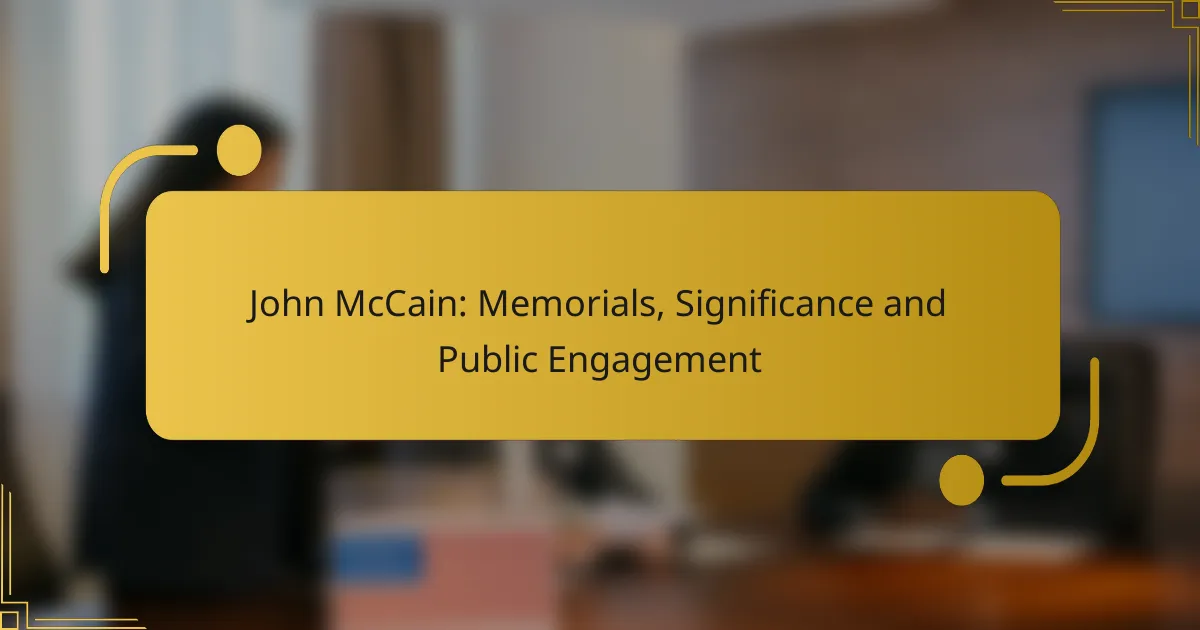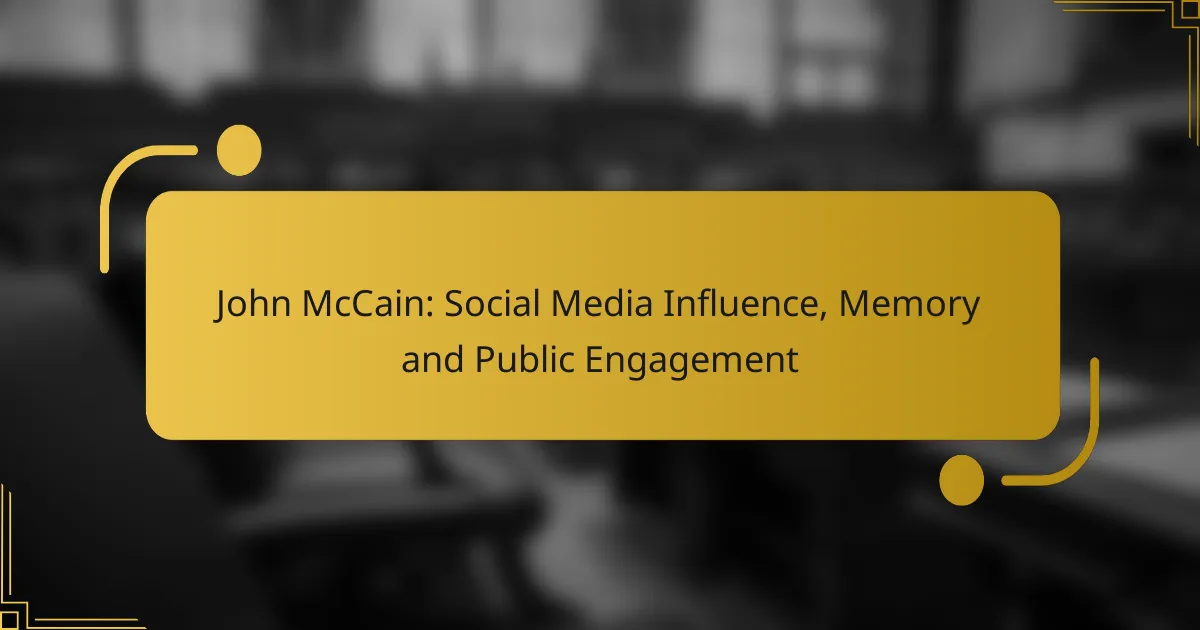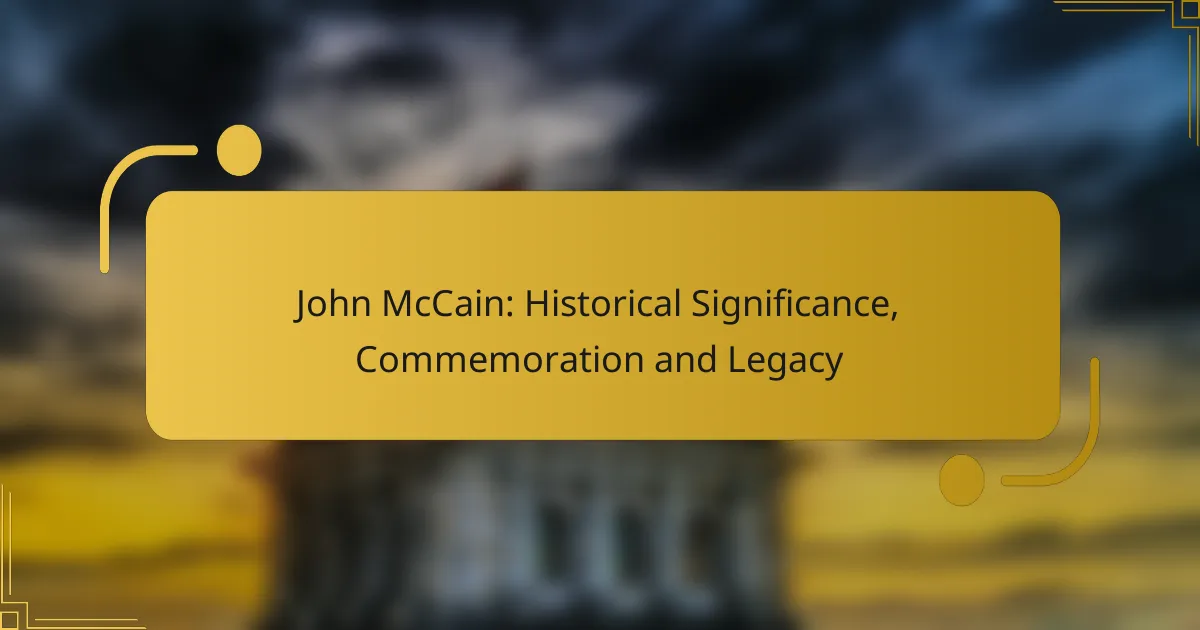John McCain’s legacy is commemorated through numerous memorials across the United States, symbolizing his impact as a war hero, senator, and dedicated public servant. His influence on American politics is marked by a commitment to bipartisanship and national service, shaping critical discussions and decisions. Throughout his career, McCain engaged with the public through town hall meetings and collaborations, emphasizing the importance of connecting with constituents and addressing national issues.
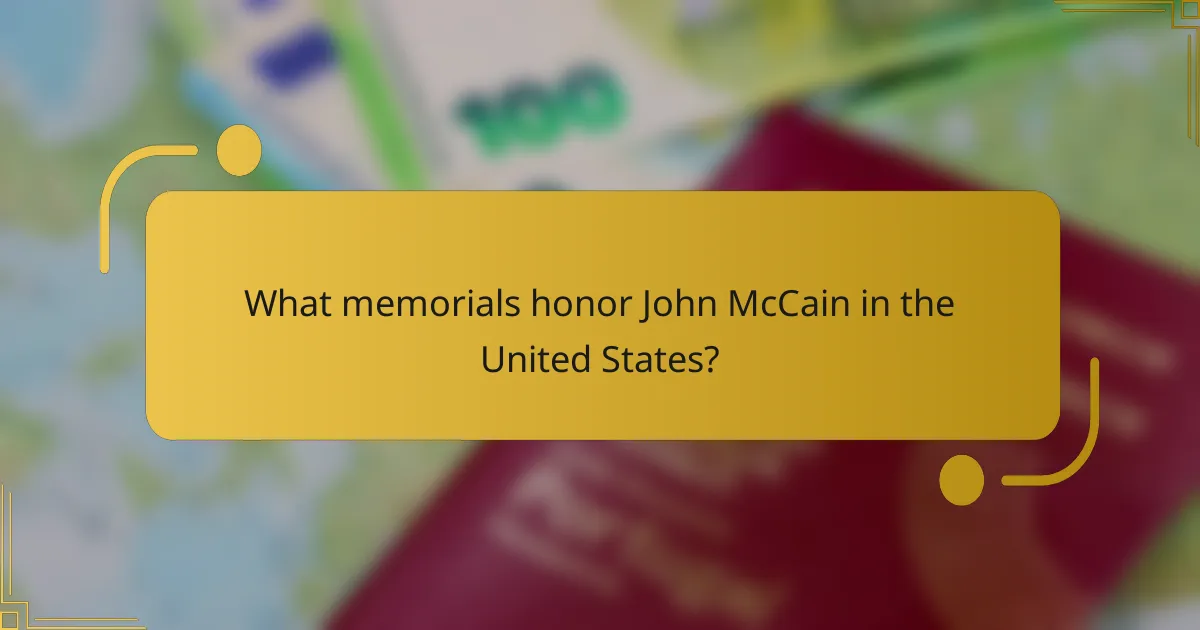
What memorials honor John McCain in the United States?
Several memorials across the United States honor John McCain, reflecting his legacy as a war hero, senator, and public servant. These sites serve as places for reflection and remembrance, celebrating his contributions to the nation.
National Memorial in Washington D.C.
The National Memorial dedicated to John McCain is located in Washington D.C., symbolizing his enduring impact on American politics and society. This memorial features a statue and plaques that highlight his service and values, attracting visitors who wish to pay their respects.
It is situated near other significant monuments, making it a part of the larger narrative of American history. Visitors can engage with the memorial through guided tours or personal reflection, deepening their understanding of McCain’s contributions.
Arizona State Capitol Memorial
At the Arizona State Capitol, a memorial honors John McCain’s roots and his long-standing connection to the state. This site includes a plaque and a dedicated area for visitors to learn about his life and political career.
The memorial serves as a focal point for Arizonans to celebrate McCain’s legacy, often hosting events and gatherings that reflect on his influence in local and national politics.
McCain’s burial site at the U.S. Naval Academy
John McCain was laid to rest at the U.S. Naval Academy in Annapolis, Maryland, where his grave is marked by a simple headstone. This burial site is significant as it reflects his military service and commitment to the Navy.
Visitors to the Naval Academy can pay their respects at his grave, which is often adorned with flowers and tokens from admirers. The site is a reminder of his dedication to his country and the sacrifices he made throughout his life.
Memorial services across major cities
Memorial services for John McCain were held in various major cities, including Washington D.C. and Phoenix, drawing thousands of attendees. These services featured tributes from family, friends, and political figures, celebrating his life and legacy.
These events provided an opportunity for the public to honor McCain’s contributions and reflect on his values of service, sacrifice, and bipartisanship. Many attendees expressed their admiration and shared personal stories, reinforcing the impact he had on individuals and communities alike.

How did John McCain influence American politics?
John McCain significantly influenced American politics through his commitment to bipartisanship, his legislative achievements, and his strong stance on foreign policy. His legacy includes a focus on national service and a willingness to collaborate across party lines, which shaped key political discussions and decisions.
Key legislative contributions
John McCain’s legislative contributions include pivotal roles in various significant laws, particularly in defense and veterans’ affairs. He co-authored the McCain-Feingold Act, which aimed to reform campaign finance and reduce the influence of money in politics.
Additionally, McCain was instrumental in passing the Veterans Access, Choice, and Accountability Act, which improved healthcare access for veterans. His efforts in these areas reflect his dedication to service members and their families.
Impact on foreign policy
McCain’s impact on foreign policy is marked by his strong advocacy for a robust U.S. presence on the global stage. He championed interventionist policies, particularly in the Middle East, arguing for a proactive approach to democracy promotion.
His support for NATO and alliances with countries like Ukraine highlighted his belief in collective security. McCain’s views often emphasized the importance of American leadership in international affairs, shaping debates on military engagement and diplomacy.
Role in bipartisan initiatives
Throughout his career, McCain was known for his efforts to foster bipartisanship in a polarized political environment. He frequently collaborated with Democrats on issues such as immigration reform, exemplified by the “Gang of Eight” immigration bill.
His ability to reach across the aisle not only advanced specific legislation but also served as a model for cooperation in Congress. McCain’s legacy encourages current and future lawmakers to prioritize collaboration for effective governance.

What public engagement activities did John McCain participate in?
John McCain was actively involved in various public engagement activities throughout his political career, focusing on connecting with constituents and addressing national issues. His efforts included town hall meetings, public speeches, and collaborations with veterans’ organizations.
Town hall meetings in Arizona
McCain frequently held town hall meetings across Arizona, providing a platform for constituents to voice their concerns and ask questions. These meetings were essential for fostering direct communication between McCain and the public, allowing him to gauge the sentiments of his voters.
During these events, McCain often addressed local issues such as healthcare, education, and immigration, tailoring his responses to the specific needs of the communities he served. His approachable demeanor encouraged open dialogue and helped build trust with his constituents.
Public speeches at national events
Throughout his career, McCain delivered numerous public speeches at national events, emphasizing key political and social issues. His speeches often focused on themes such as patriotism, bipartisanship, and the importance of democratic values.
These addresses not only showcased his leadership but also inspired many Americans to engage in civic activities. McCain’s ability to articulate complex issues in a relatable manner made his speeches memorable and impactful.
Engagement with veterans’ organizations
As a veteran himself, McCain was deeply committed to engaging with veterans’ organizations. He frequently participated in events and initiatives aimed at improving the lives of veterans and their families, advocating for better healthcare and support services.
McCain’s involvement included working with groups like the American Legion and Veterans of Foreign Wars, where he addressed issues such as mental health care and benefits. His advocacy efforts helped raise awareness and drive policy changes that benefited the veteran community.
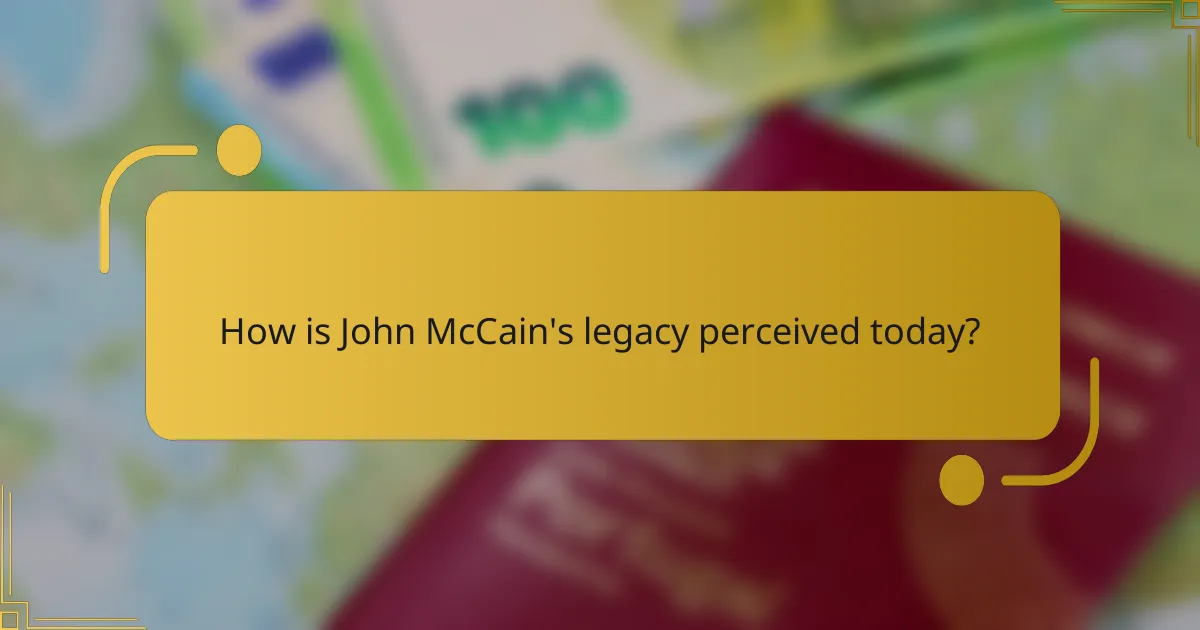
How is John McCain’s legacy perceived today?
John McCain’s legacy is viewed as a complex blend of patriotism, bipartisanship, and principled leadership. Many recognize him for his service and commitment to the country, while others critique his political decisions and stances.
Public opinion polls on his impact
Public opinion polls indicate that John McCain is often remembered positively, with many Americans appreciating his dedication to service and willingness to cross party lines. Surveys conducted after his passing showed that a significant portion of the population viewed him as a model of integrity and courage in politics.
However, opinions can vary widely based on political affiliation. For instance, Republicans may emphasize his conservative values, while Democrats might focus on his more moderate positions, leading to a diverse range of perceptions about his overall impact on American politics.
Comparisons with contemporary politicians
When comparing John McCain to contemporary politicians, he is frequently seen as a rare figure who prioritized national interest over party loyalty. His willingness to engage in bipartisan efforts sets him apart from many current leaders who often adhere strictly to party lines.
Additionally, McCain’s approach to foreign policy, particularly his advocacy for a strong military presence and international alliances, contrasts with the more isolationist tendencies observed in some modern political figures. This difference highlights the evolving nature of political ideologies and the challenges faced by today’s leaders in navigating complex global issues.
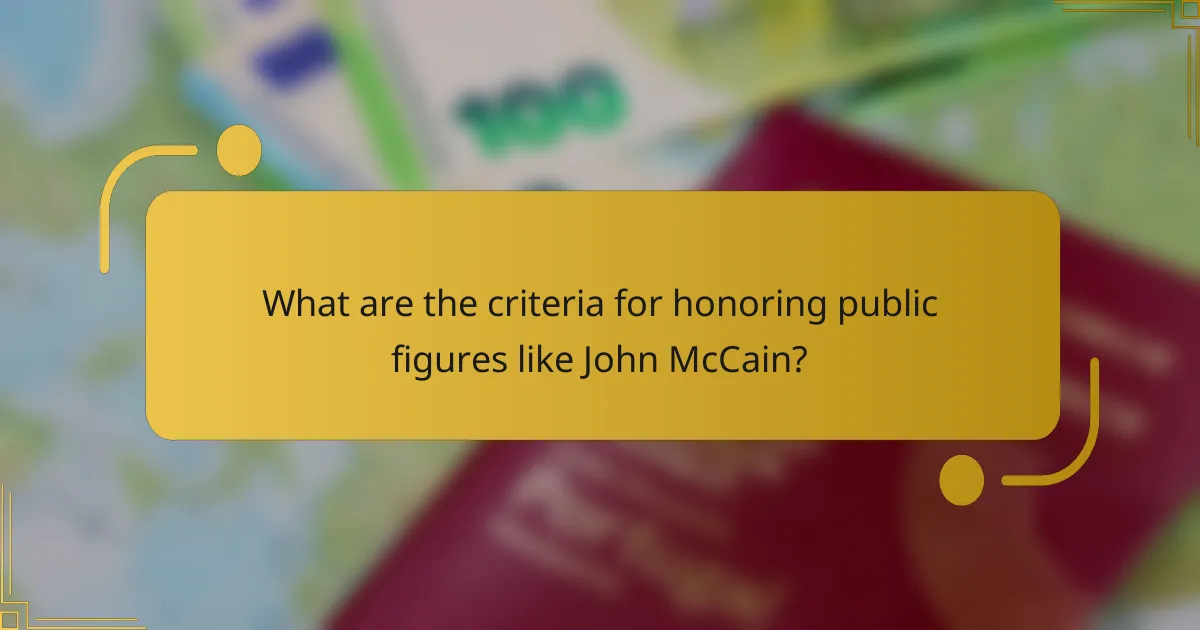
What are the criteria for honoring public figures like John McCain?
Honoring public figures like John McCain typically involves a combination of their contributions to society, public service, and the impact they had on their communities. Criteria often include recognition of their achievements, the legacy they leave behind, and the public’s desire to commemorate their life and work.
National recognition standards
National recognition for public figures often follows established protocols, such as presidential proclamations, congressional resolutions, or the establishment of national memorials. These honors usually require significant public support and can be influenced by the individual’s role in pivotal historical events or their contributions to national policy.
For example, figures like John McCain may be honored with a state funeral, which involves specific ceremonies and protocols, including military honors and participation by government officials. Such recognitions are typically reserved for individuals who have made substantial impacts on the nation.
Community-driven memorial initiatives
Community-driven memorial initiatives often arise from local efforts to honor public figures who have made significant contributions at the grassroots level. These can include the establishment of parks, scholarships, or community events that celebrate the individual’s legacy and values.
Local communities may organize fundraising campaigns to create physical memorials or host annual events that reflect the honoree’s ideals. Engaging the community in these initiatives fosters a sense of ownership and connection to the figure being honored, ensuring their contributions are remembered and celebrated over time.

What emerging trends are shaping memorials for public figures?
Emerging trends in memorials for public figures focus on personalization, interactivity, and inclusivity. These trends reflect a shift towards creating more meaningful and engaging experiences that resonate with diverse audiences.
Personalization in Memorials
Personalization is becoming a key element in memorials, allowing for unique tributes that reflect the individual’s life and values. This can include custom sculptures, interactive displays, or even digital memorials that tell the person’s story through multimedia.
For instance, some memorials now incorporate QR codes that link to videos or testimonials, enabling visitors to engage with the honoree’s legacy in a more personal way. This trend enhances emotional connections and encourages visitors to reflect on the individual’s impact.
Interactive and Digital Elements
Interactive elements are increasingly common in memorials, providing visitors with opportunities to participate in the experience. This can range from touchscreens that offer information to augmented reality features that bring stories to life.
Digital memorials, such as online tribute pages, allow for global engagement, where people can share memories and condolences. This trend is particularly relevant in today’s digital age, as it enables a wider audience to connect with the memorial regardless of location.
Inclusivity and Community Engagement
Inclusivity is a growing focus in the design of memorials, ensuring that they represent diverse communities and perspectives. This can involve community input during the planning process to ensure that the memorial resonates with a broad audience.
Engaging the community can also take the form of collaborative projects, where local artists and residents contribute to the memorial’s design. This approach fosters a sense of ownership and connection, making the memorial a shared space for reflection and remembrance.
